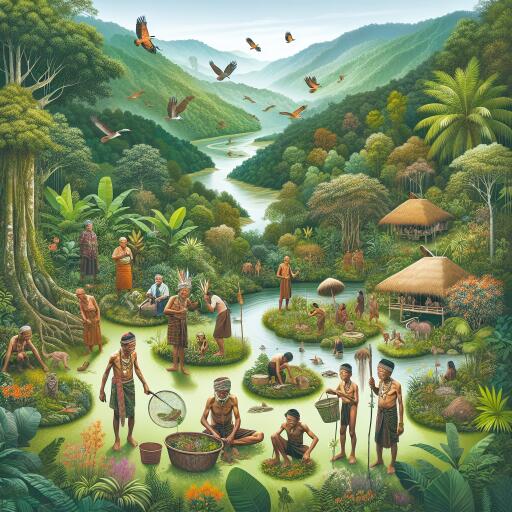
Orang Asli: Custodians of Malaysia’s Ecological Treasure
In the intricate web of global biodiversity, indigenous populations hold a pivotal role, with their territories sheltering a significant portion of the world’s ecological wealth. Among these indigenous custodians, Malaysia’s Orang Asli emerge as vital guardians of the nation’s rich biodiversity.
Worldwide, there are an estimated 476 million indigenous people spread across 90 countries, safeguarding 28% of the Earth’s surface. This includes a staggering 11% of the world’s forests, areas that are not only havens of biodiversity but also carbon sinks crucial for fighting climate change. Within this global context, the Orang Asli of Peninsular Malaysia, along with the Bumiputera of Borneo, stand as the ancestral inhabitants and stewards of Malaysia’s natural heritage.
The Orang Asli community is diverse, consisting of three main groups: the Proto-Malays, Negritos, and Senois, further branching into 18 distinct ethnic subgroups. Predominantly residing in Pahang, Perak, and Selangor, these communities exhibit a profound connection with their ancestral lands and ecosystems.
Acknowledging the importance of the Orang Asli’s role in ecological preservation, Malaysia aligns with the United Nations Declaration on the Rights of Indigenous Peoples (Undrip). This international mandate affirms the Orang Asli’s right to inhabit their traditional lands, safeguard their environment, and manage their resources sustainably. It emphasizes the necessity of their consent for any relocation and underscores their integral role in environmental conservation efforts.
Despite the universal scope of Undrip, real-world application often sees the Orang Asli’s traditional knowledge and land rights overlooked. The resilience of these communities in the face of such challenges is commendable, as they continue to play a critical role in the conservation of Malaysia’s forests and biodiversity. A shining example of this dedication is the Jahai, an Orang Asli subgroup, renowned for their stewardship of the Royal Belum State Park, Amanjaya, and Korbu Forest Reserves.
The Jahai’s commendable efforts in environmental conservation, particularly their pivotal role in combating poaching and preserving the natural habitat of the Malayan tiger, have garnered international recognition. In 2023, the Jahai’s patrol unit, Menraq, received the prestigious International Ranger Award from the International Union for Conservation of Nature World Commission on Protected Areas (IUCN WCPA), a testament to their effective fusion of traditional ecological knowledge and modern conservation techniques.
As the world marks the International Day of the World’s Indigenous Peoples, it is imperative to spotlight the Orang Asli’s unwavering commitment to protecting Malaysia’s biodiversity. Their exemplary role goes beyond local importance, contributing meaningfully to global biodiversity conservation efforts. The commemoration of this day underscores the urgent need to support and collaborate with the Orang Asli, ensuring their rights are respected and their vast knowledge is utilized in biodiversity preservation strategies.
Empowering the Orang Asli is not just about fulfilling a moral obligation; it is about recognizing their invaluable contribution to our shared environmental heritage. By integrating their traditional wisdom with contemporary sustainability initiatives, Malaysia can not only safeguard its ecological treasures but also model a pathway towards sustainable living that honors the rights and contributions of its indigenous populations.
In conclusion, embracing the Orang Asli as equitable partners in biodiversity conservation is not merely an act of environmental stewardship; it is a fundamental step towards achieving a just and sustainable future. Through mutual respect and collaboration, we can unlock the potential of Orang Asli communities to inspire and lead global environmental initiatives, ensuring a vibrant and biodiverse planet for generations to come.





Leave a Reply